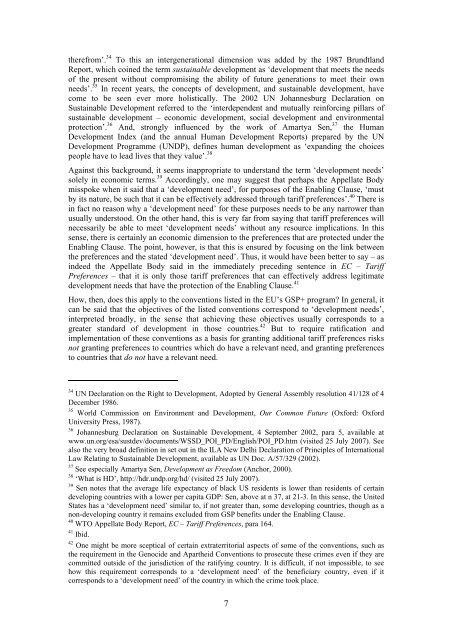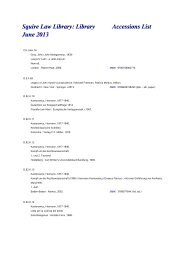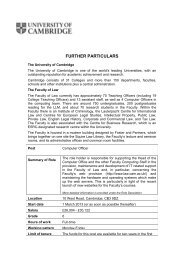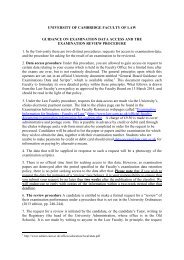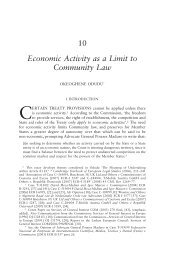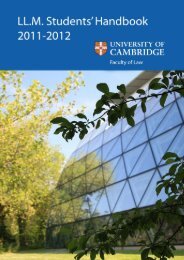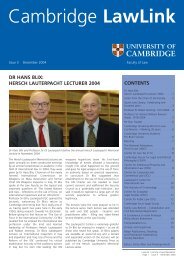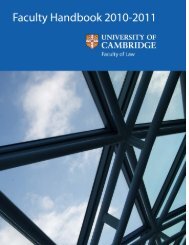The WTO legality of the EU's GSP+ arrangement Dr Lorand Bartels ...
The WTO legality of the EU's GSP+ arrangement Dr Lorand Bartels ...
The WTO legality of the EU's GSP+ arrangement Dr Lorand Bartels ...
Create successful ePaper yourself
Turn your PDF publications into a flip-book with our unique Google optimized e-Paper software.
<strong>the</strong>refrom’. 34 To this an intergenerational dimension was added by <strong>the</strong> 1987 BrundtlandReport, which coined <strong>the</strong> term sustainable development as ‘development that meets <strong>the</strong> needs<strong>of</strong> <strong>the</strong> present without compromising <strong>the</strong> ability <strong>of</strong> future generations to meet <strong>the</strong>ir ownneeds’. 35 In recent years, <strong>the</strong> concepts <strong>of</strong> development, and sustainable development, havecome to be seen ever more holistically. <strong>The</strong> 2002 UN Johannesburg Declaration onSustainable Development referred to <strong>the</strong> ‘interdependent and mutually reinforcing pillars <strong>of</strong>sustainable development – economic development, social development and environmentalprotection’. 36 And, strongly influenced by <strong>the</strong> work <strong>of</strong> Amartya Sen, 37 <strong>the</strong> HumanDevelopment Index (and <strong>the</strong> annual Human Development Reports) prepared by <strong>the</strong> UNDevelopment Programme (UNDP), defines human development as ‘expanding <strong>the</strong> choicespeople have to lead lives that <strong>the</strong>y value’. 38Against this background, it seems inappropriate to understand <strong>the</strong> term ‘development needs’solely in economic terms. 39 Accordingly, one may suggest that perhaps <strong>the</strong> Appellate Bodymisspoke when it said that a ‘development need’, for purposes <strong>of</strong> <strong>the</strong> Enabling Clause, ‘mustby its nature, be such that it can be effectively addressed through tariff preferences’. 40 <strong>The</strong>re isin fact no reason why a ‘development need’ for <strong>the</strong>se purposes needs to be any narrower thanusually understood. On <strong>the</strong> o<strong>the</strong>r hand, this is very far from saying that tariff preferences willnecessarily be able to meet ‘development needs’ without any resource implications. In thissense, <strong>the</strong>re is certainly an economic dimension to <strong>the</strong> preferences that are protected under <strong>the</strong>Enabling Clause. <strong>The</strong> point, however, is that this is ensured by focusing on <strong>the</strong> link between<strong>the</strong> preferences and <strong>the</strong> stated ‘development need’. Thus, it would have been better to say – asindeed <strong>the</strong> Appellate Body said in <strong>the</strong> immediately preceding sentence in EC – TariffPreferences – that it is only those tariff preferences that can effectively address legitimatedevelopment needs that have <strong>the</strong> protection <strong>of</strong> <strong>the</strong> Enabling Clause. 41How, <strong>the</strong>n, does this apply to <strong>the</strong> conventions listed in <strong>the</strong> EU’s <strong>GSP+</strong> program? In general, itcan be said that <strong>the</strong> objectives <strong>of</strong> <strong>the</strong> listed conventions correspond to ‘development needs’,interpreted broadly, in <strong>the</strong> sense that achieving <strong>the</strong>se objectives usually corresponds to agreater standard <strong>of</strong> development in those countries. 42 But to require ratification andimplementation <strong>of</strong> <strong>the</strong>se conventions as a basis for granting additional tariff preferences risksnot granting preferences to countries which do have a relevant need, and granting preferencesto countries that do not have a relevant need.34 UN Declaration on <strong>the</strong> Right to Development, Adopted by General Assembly resolution 41/128 <strong>of</strong> 4December 1986.35 World Commission on Environment and Development, Our Common Future (Oxford: OxfordUniversity Press, 1987).36 Johannesburg Declaration on Sustainable Development, 4 September 2002, para 5, available atwww.un.org/esa/sustdev/documents/WSSD_POI_PD/English/POI_PD.htm (visited 25 July 2007). Seealso <strong>the</strong> very broad definition in set out in <strong>the</strong> ILA New Delhi Declaration <strong>of</strong> Principles <strong>of</strong> InternationalLaw Relating to Sustainable Development, available as UN Doc. A/57/329 (2002).37 See especially Amartya Sen, Development as Freedom (Anchor, 2000).38 ‘What is HD’, http://hdr.undp.org/hd/ (visited 25 July 2007).39 Sen notes that <strong>the</strong> average life expectancy <strong>of</strong> black US residents is lower than residents <strong>of</strong> certaindeveloping countries with a lower per capita GDP: Sen, above at n 37, at 21-3. In this sense, <strong>the</strong> UnitedStates has a ‘development need’ similar to, if not greater than, some developing countries, though as anon-developing country it remains excluded from GSP benefits under <strong>the</strong> Enabling Clause.40 <strong>WTO</strong> Appellate Body Report, EC – Tariff Preferences, para 164.41 Ibid.42 One might be more sceptical <strong>of</strong> certain extraterritorial aspects <strong>of</strong> some <strong>of</strong> <strong>the</strong> conventions, such as<strong>the</strong> requirement in <strong>the</strong> Genocide and Apar<strong>the</strong>id Conventions to prosecute <strong>the</strong>se crimes even if <strong>the</strong>y arecommitted outside <strong>of</strong> <strong>the</strong> jurisdiction <strong>of</strong> <strong>the</strong> ratifying country. It is difficult, if not impossible, to seehow this requirement corresponds to a ‘development need’ <strong>of</strong> <strong>the</strong> beneficiary country, even if itcorresponds to a ‘development need’ <strong>of</strong> <strong>the</strong> country in which <strong>the</strong> crime took place.7


